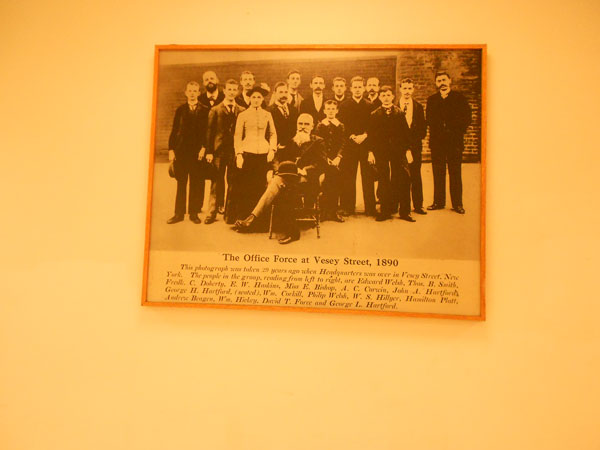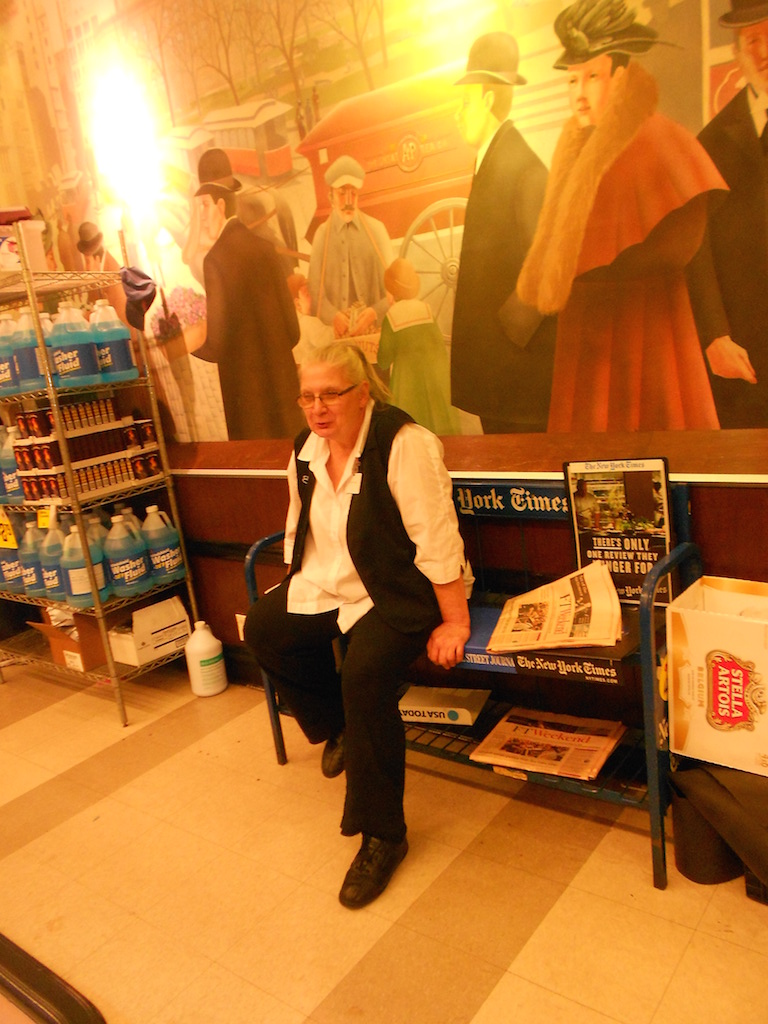
A vintage photo of the A&P chain’s founders and staff hangs on the wall at the E. 15th St. Food Emporium supermarket, now under Key Food ownership. A&P started out on Vesey St. in Lower Manhattan.
BY MARY REINHOLZ | Known for its store-made heat-and-eat entrees, sushi bar and gourmet delicacies, the Food Emporium supermarket at 10 Union Square East changed hands Nov. 9. The transfer occurred a few weeks after its new owner, Key Food Co-Operative, Inc., acquired the store in a court-supervised bankruptcy sale from the market’s former corporate parent, The Great Atlantic & Pacific Tea Company, otherwise known as A&P. A guard shooed away customers during the one-day transition.
On Tues., Nov. 10, with no formal notice of different management outside its doors, Food Emporium reopened with diminished stock but maintained its deli, hot foods and large bakery, featuring artisanal breads and elaborately decorated cakes. All the checkout scanning machines had been temporarily shut down. Signs noted that purchases via food stamps (E.B.T.) were not yet available. Cashiers could not provide “cash backs” on electronic buys for sometime.
But the upscale Union Square store kept the Food Emporium banner, signage and e-business after Key Food purchased that brand’s intellectual property rights for about $1.75 million in a separate deal overseen by the White Plains U.S. bankruptcy court in the Southern District of New York. However, fliers soon appeared listing sale items from Marketplace Emporium, a possible new name for the store.
A manager for the bustling Key Food chain, founded in Brooklyn in 1937 and now headquartered in Staten Island, said five days later, that none of the employees from the A&P regime had lost their jobs but some were “transferred” to other stores in New York and New Jersey.
A&P, the onetime king of American grocers, is attempting to unload 120 of its 296 Northeastern stores for $600 million after the company’s second filing for Chapter 11 bankruptcy protection in five years, sources say. Brian Shiver, a spokesperson, declined to comment. But a Manhattan retail executive familiar with the hush-hush proceedings said that A&P is on the brink of dissolving.
“A&P is selling off or closing specific stores. Key Food bought intellectual property rights to the Food Emporium brand, but that doesn’t mean for all the Food Emporium locations,” he said. He referred to three other Manhattan Food Emporiums that Key Food purchased, bringing the chain’s total acquisition of A&P stores to 23. (These include three Pathmarks and 10 Waldbaums.)
Describing the situation as “fluid and complex,” the source noted that technically “any Key Food store can be turned into a Food Emporium” under terms of the A&P sale of its property rights, which includes ownership of A&P’s discount brand America’s Choice. A&P bought the Food Emporium grocery chain of 16 stores in 1986 from its former parent, Shopwell, Inc.
Even though the Union Square Food Emporium’s stock had been dwindling for weeks, some customers said they “didn’t know” about the store’s new ownership and the apparent impending demise of the venerable 156-year-old A&P. The store started out on Vesey St. in Lower Manhattan as a tea and spice business founded by merchants George Huntington Hartford and George Gilman. Vintage pictures of the old A&P stores still line the walls at Food Emporium’s E. 15th St. entrance between Park Ave. South and Irving Place, including an immense photo of the Vesey St. “headquarters” in 1890.
But other seasoned regulars were well aware that a new day had arrived.
“Is it going to be called Key Food now or the same?” inquired Waheed Salam, an airline pilot and resident at Zeckendorf Towers, as he checked store hours around 8:30 a.m. on the first day of the changeover. Salam, who has patronized Food Emporium for 20 years, said he had asked a manager about the store’s future.
Food Emporium managers declined to answer questions from The Villager, one noting she had been told by Key Food “not to speak to the press.”
Local 342 of the United Food and Commercial Workers in Long Island did not return calls by press time. But Sophie Henderson, 60, a part-time night manager who worked at the Union Square Food Emporium for 17 years, said over the weekend of Nov. 7 that she was resigning without “any severance” and would receive her late husband’s Social Security benefits.
“I’ve seen so many things over the years,” she mused with a smile as she sat on a Food Emporium newsstand, which still carries copies of The Villager. She noted that Key Food would be “sending trucks in” to replenish merch on the first day of the takeover.
On that day, one Key Food staffer, standing by cans of cat food selling for 69 cents each, said the store’s pricing for products will remain basically the same, “with a little fluctuation.” (A flier for sales for Nov. 11-19 listed four “large” Hass avocadoes for $5; imported Norwegian Jarlsberg cheese for $6.99 a pound; boneless chicken breasts for $1.99 a pound; and store-made strawberry shortcake “fresh daily” at $19.99.)
Key Food’s corporate office did not disclose its price for purchasing the Union Square store and 22 others from A&P. The sales are expected to be completed this month.

A spokesperson for Dean Janeway, C.E.O. of Key Foods, said he could “not accommodate” an interview. But in a prepared statement dated Oct. 22, the company said its acquisition of the 23 A&P supermarkets will bring the number of the chain’s stores to 212 and add $400 million in annual retail sales, for a projected yearly total of $2.3 billion. The statement also claimed the company’s buys will “preserve” 1,800 jobs of A&P employees.
Neil Saunders, managing director of Columino, a retail research and consulting agency, said in an e-mail that A&P was divesting its stores “because it needs to pay down its debt as part of the bankruptcy proceedings. This debt, as well as the weak financials, means the business is not viable as a going concern, which is why it is now being carved up.”
A&P, which claims it introduced the first U.S. supermarket in 1936, reported owning 16,000 stores by the 1940s. When the company sought federal bankruptcy protection for the second time since 2010, it cited about $2.3 billion in debts and $1.6 billion in assets.
Saunders said a few of the A&P stores are in “suboptimal locations” and have not been purchased, but others are in good positions and have been “snapped up” by competitors.
“Union Square is a case in point, which is why Key Food bought it along with the 68th St., 50th St. and 42nd St. locations,” he said. “The logic for Key Food is obvious: It gives the company an opportunity to grow its presence in the heart of Manhattan.”
Although unions have offered concessions to A&P in recent years, some critics blame the cost of union benefits for the company’s financial problems. Others, while saying the union’s policies may have contributed to A&P’s downfall, also note that the grocery behemoth — born in horse-and-buggy days — failed to catch up with the times. The chain, these observers say, struggled to compete with newcomers, like Whole Foods Market and Trader Joe’s, both of which have stores in Union Square.
Chuck Lanyard, president of the Goldstein Group, which specializes in retail brokerage and consulting, said A&P had become “slow” and “its competitors have done a better job.” He believes the company will soon vacate its “huge” corporate headquarters in Montvale, N.J.
“An icon is disappearing, but that’s the nature of things,” he said. “There’s always a new kid on the block.”




































